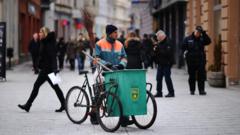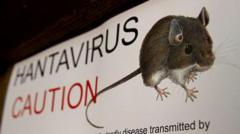In Sarajevo, the situation has escalated to an alarming state, as residents witness the rampant spread of rats in their neighborhoods and the Miljacka river. Photos circulating on social media reveal overflowing rubbish bins and the presence of decaying animals in public areas, including playgrounds for children. These conditions have created an ideal breeding ground for rodents, prompting health professionals to warn about the associated risks to public health.
One of the most pressing concerns is leptospirosis, often referred to as rat fever, which has seen over a dozen cases reported in just one 24-hour period at the local hospital. This disease is spread through water or soil contaminated with rodent excretions, presenting symptoms ranging from headaches and muscle pain to severe complications like jaundice and kidney failure in acute cases.
In response to the growing crisis, local authorities in Sarajevo have declared an epidemic and activated emergency protocols. This week, additional municipal workers equipped with disinfectants have been dispatched throughout the city to clean public spaces, alongside efforts to increase waste collection frequency. Schools have received orders to maintain clean playgrounds and inspect their facilities for rodent infestations.
Previously, pest control measures were inadequate, with authorities citing issues with a tender process that hampered extermination efforts. As a result, rats, along with packs of stray dogs, have proliferated across the capital, creating a public health quandary, according to Sarajevo Canton Health Minister Enis Hasanovic. He emphasized that the ongoing situation represents a community crisis rather than just a health crisis, underscoring the need for effective municipal hygiene practices.
Despite the growing concerns, former director of Sarajevo's University Clinical Centre, Sebija Izetbegović, warns that the health implications may worsen, noting the high population of "well-fed rats," which could lead to the spread of hantavirus. Fortunately, the current reports of leptospirosis have not resulted in severe cases, as the mortality risk for untreated conditions remains significant.
The residents of Sarajevo are left to hope that rapid responses will help stem the tide of this rodent-induced crisis before it spirals into a more dire public health emergency.

















